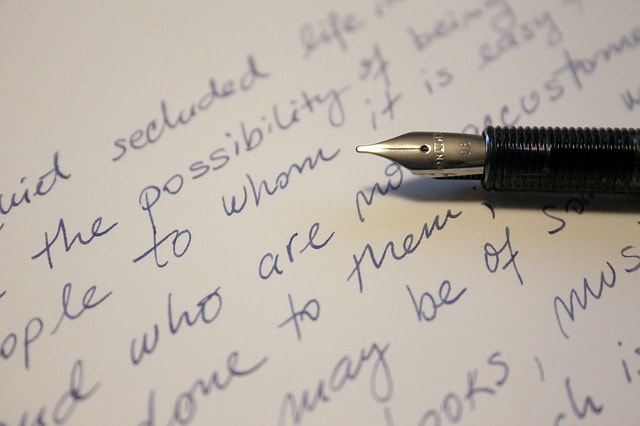
If you could show up to work late without penalty, would you? How about work projects? If your boss gave you an unlimited time to turn in reports, would you submit them early? How about working out? If you suffered no ill effects from skipping workouts, would you still hit the gym several times a week or would you spread out your workouts?
In all areas of our lives, we are surrounded by layers of accountability. Our employers expect us to meet their expectations of timeliness and quality. The IRS expects us to submit our tax returns in on time. The library expects us to return books on time and fines us when we do not. And professors mark a zero in the grade book when we submit an assignment late.
When there are expectations connected to an activity, then we tend to meet them. They add a layer of accountability that ensures the success of the endeavor and lessens the chaos. Without accountability, would any of us pay a parking ticket? I think my Aunt Mary Jane would because she is a highly organized, detail-oriented lady, but I can’t say that I would.
So, how might accountability affect writers? We tend to work in solitary environments made of one writer at one desk. Most of us work without someone to supervise our writing. For the majority of writers, we work on our projects when we carve the time out of life’s less-interesting responsibilities. Without someone to shout, “Where is the manuscript?” will we complete our novels and edit our stories well enough to send them off to an agent? In many cases, no.
For whatever reason, when we are beholden only to ourselves, we tend to fail more often than succeed. Likely this is why 97% of writers do not finish their novels; no one but themselves expects them to.
Think of it this way: Have you ever tried to lose weight, quit smoking, or start a meditation program solely for your own benefit and without any external accountability? How effective was it? But if your doctor instructed you to lose weight, drop your addiction, and relax or face serious consequences, you may be more successful at achieving the goal. As writers, we can recognize that this is the case for many of us and take steps to add a layer of accountability to our writing routines. Here's how: Subscribe to the Writer's ListGet the writer's blog delivered to your email. Attain an effortless writing process with tips and tricks that support your love of writing. Success! Now check your email to confirm your subscription.
1. Create a Writing Plan
Decide exactly how you'll use your writing time so that you are producing writing. A friend told me about leaving her writer’s group to make more time to write. I understand the mental space she was in, because writers are constantly challenged to work our writing into the little creases of life. Sometimes, family or work or some other responsibility rears up and your writing time is gone. For most of us, having a plan is a more successful path than operating without one. If you aren’t setting aside time to write, you cannot reach the point of being accountable. Your first step is to write, and that rarely happens without a plan. Create a writing plan that includes routine and ritual with a balance of sticks and carrots. The plan does not need to be complicated to work.
2. Get an Accountability Partner
I meet a colleague once a week to write. At the beginning of our meetings, we always ask each other what we are writing and what we plan to accomplish. This simple act of checking in at the start of a writing session creates a level of accountability between us. We also check in with each other throughout the week just to see how things are going with our writing. I tend to work in fits and spurts, but I work on my writing every day. Having an accountability partner keeps my projects moving forward, even when I am in a slower writing cycle. 3. Hire an Accountability Coach Some writers need an external accountability coach to support their writing progress. Recently, I worked with a PhD student who had made no progress on her dissertation for seven years. I created a production plan for her and we worked together on a daily basis between emails, texts, and phone calls. Within about six months, she had her dissertation prepared for defense and no longer needed me as her coach. Spending the time and money on an accountability coach can make a huge difference. Sometimes writers get stuck in a rut and need additional support to break free and maneuver onto a new pathway of productivity.
4. Join a Writer’s Group
Of course, this always depends on the writer’s group. Some groups tend to be critical or competitive or unproductive, so choose a group that supports your writing path. For many, a good writer’s group is one with people who encourage your development as a writer, offer constructive critique, and hold you accountable. If a writer’s group does not fit your needs, find another one. I attended one group where no one talked to each other; they sat down at a café, wrote for an hour or so, and left without speaking besides a quick greeting. I needed more interaction so I left the group. Another group offered the opposite: constant talking and no writing. It was more of an extrovert’s therapy session than a writer’s group. Without time to write during the meet-ups, I made my excuses and left the group. Finding a group that fits your personality, writing style, and needs may take a bit of work, but the payoff of joining a group of writers with similar goals can be immeasurably valuable to your success. 5. Apply Your Inner Grit and Get it Done Like all challenging goals, writing is about hard work. The hardest step to take is sitting down at the keyboard. Set up your space to write and get started. It may feel foreign if you have been unproductive for a while, but hold yourself accountable by sticking to a schedule, working with a partner or coach, and buckling down to write. Related Blog Posts
|
About the SiteWelcome, Writers! Archives
September 2023
|






 RSS Feed
RSS Feed